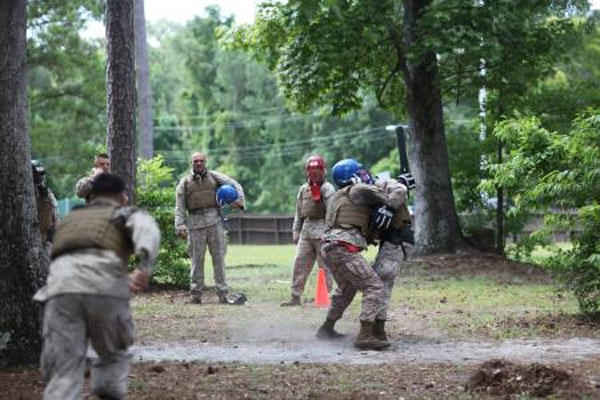CAMP LEJEUNE, N.C. - In 2000, Gen. James L. Jones, the commandant of the Marine Corps, sought a replacement for the Linear Infighting Neural Override Engagement system, a form of close quarters combat derived from multiple forms of martial arts.
The publication of Marine Corps Order 1500.54 officially introduced the Marine Corps Martial Arts Program, or MCMAP, in 2002 to enhance the combat readiness of Marines.
In order to train servicemembers in MCMAP, the Marine Corps needed martial arts instructors to spread its required knowledge and skill sets, but Marines first had to face many physical and mental challenges to become those instructors.
“We call it combat conditioning,” said Staff Sgt. Jason P. Sweno, a heavy equipment operator and MCMAP instructor with 8th Engineer Support Battalion, 2nd Marine Logistics Group. “We have four hours a day of warm ups, martial arts drills and deployment drills, so the Marines learn a wide array of ways to train their Marines and get them ready for combat.”
The program uses a belt system similar to other martial arts. There are five belts: tan belt, gray belt, green belt, brown belt and six black belt degrees. Service members with green, brown or black belts may also become MCMAP instructors and receive brown tabs on their belts when they become qualified as instructors or red tabs if they become black belt instructor trainers.
Marines learn about the origins of MCMAP and study warrior cultures, which include the Spartans, to assist in understanding how cultures can focus on discipline and create better warriors based on constant practice.
“You could take a Marine who has perfect scores on the physical fitness test and combat fitness test and throw him into a martial arts instructor course, and on the third day he says this isn’t for him,” said Sweno. “He can show up to a PFT and CFT and have a perfect score, but in reality, when we go to combat, we aren’t running PFTs or CFTs. If he has a combat conditioning program, he’s got a mindset where he doesn’t know what every enemy or challenge is, and that can help him succeed.”
The Marines perform a wide variety of exercises, such as physically intense workouts, squad runs carrying logs and hikes in full combat gear to improve physical strength, but they need more than strong bodies to make it through the course.
“This definitely isn’t like sergeant’s course,” said Sgt. Shaun R. Finch, a bulk fuel specialist with 8th ESB. “It really tests your willpower and drive, physical and mental strength and your character. This is all about teamwork – no one is an individual here.”
Each Marine in the course is expected to remember the MCMAP techniques and knowledge, but also has to be comfortable leading and building proficiency in other servicemembers’ MCMAP skills.
“We’re reviewing techniques we’ve already learned, but the focus here is on learning how to instruct Marines,” said Finch, a native of Dunlap, Tenn. “It’s not just the usual ‘let’s get through this technique’ mindset. We’ll be the ones with stopwatches and evaluating how other Marines are advancing through (MCMAP).”
The Marines learn to instruct and assess up to their belt levels, which includes speaking in front of their classes, administering written and practical application tests and passing on the stories and skills they learned during training.
“The course itself was really tough,” said Sgt. Joseph L. Pass, a generator mechanic with 10th Marine Regiment, 2nd Marine Division. “I didn’t buy into it until the end when all the principles they taught us started setting in. Once I started learning about myself, how much I could push myself and how much I could retain mentally, I really started believing in this.”
The sizes of the classes vary, but each class usually shrinks throughout the course and leaves only the most determined participants, said Sweno.
“I see in their eyes when they graduate what this program means to them and how much they want to bring this back to the Marines they work with,” said Sweno. “This isn’t for everyone. Not everyone can be a martial arts instructor just like not everyone can be a United States Marine.”




























